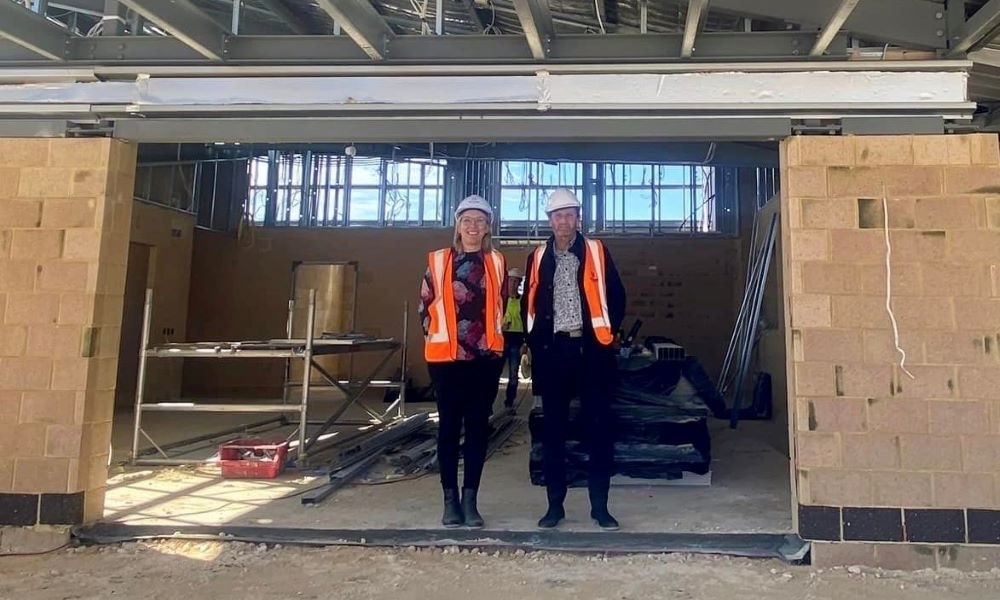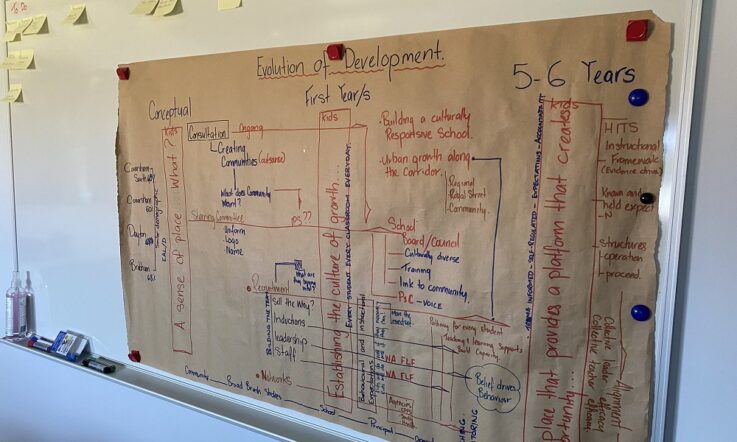Thanks for downloading Episode 2 of our new podcast series, School Assembly. I’m Zoe Kaskamanidis.
In this new series, we follow Principal Ray Boyd and Associate Principal Rachael Lehr as they navigate the exciting and challenging journey of building a new school community from the ground up. Each month, we touch base for updates and reflections on their progress as their new school, Dayton Primary School, is built in the newly developing suburb of Dayton, located in the eastern metropolitan city of Swan in Perth, Western Australia.
Last month, we spoke to Ray about the first 6 months of his journey, and he gave us a great recap of the school’s progress so far. In this episode, we speak with both Rachael and Ray about setting short- and long-term goals, including how they’ve prioritised their goals, responded to unexpected hurdles and managed workload alongside ambition. Let’s jump in.
Zoe Kaskamanidis: Hi Rachael and Ray, how are you both this morning?
Ray Boyd: Good thanks, Zoe.
Rachael Lehr: I’m good thanks too, how are you?
ZK: I’m good thanks, it’s so lovely to have you both join us.
RB: Oh it’s good to be back!
ZK: There’s quite a few big milestones you’ve reached this last month so that’s very exciting.
RB: Yeah, we got our name – I think it was last week. And then things snowballed very quickly once we had the name – the uniforms and a few other things we were able to progress.
ZK: Absolutely, that’s fantastic. And so, in episode one last month, Ray gave us a fantastic recap of the first 6 months of your journey. And we’d flagged that in this episode, we’ll dive deeper into the topic of setting short- and long-term goals. But first, and like I said, there’s been, you know, some massive milestones over the past month which I’m sure we’ll get into a bit more. I also wanted to say a big congratulations on appointing your Manager of Corporate Services (MCS), because I know that Ray, last time we talked, you said it was one of the big next steps coming up.
RL: Yeah it’s very exciting. We’ll have our third staff member in our office starting on this Friday so we’ll move from 2 to 3, so it’s a big tick!
ZK: Brilliant. So, while this is episode 2 of our podcast series and we’re looking at setting short- and long-term goals, we’ve mentioned before that a lot of our topics will actually be relevant and ongoing all the way through the process of building up a new school, and even once the school opens. So I think we can safely say this is one of them.
RL: Yep.
ZK: But I reckon let’s start by chatting a bit about how you’ve come up with your goals so far – so has this been quite a clear and structured process for you, or more organic and responsive to your ideas as they arise? And how do you manage ambition against workload?
RB: I don’t have any ambition, Zoe, so that’s that off the table. No, look, it probably started – the goals started with the interview process for the position because we had quite a large chart – I think it was actually included in [the photo story] that you showed. So that sort of set our goals. The first goal was getting the prospectus up and running because that’s created the mission for the school and everything generated from that.
But the department does provide a – it’s like a go-to book of the things that you need to tick off or should be trying to tick off as a new school. What it doesn’t do, it doesn’t give you an order though, so it’s trying to work out where and what you see as being priority in that space.
But obviously for me, the initial goal was getting someone on board to discuss leadership and curriculum and that was Rachael in this case. And then after that, now we’re looking at curriculum and establishing the actual instructional side of things which Rachael is doing a lot of work on at the moment.
RL: And Zoe, I came in about 3 months after Ray, so when I came in there was already this board up here with all the things that needed to be done and whether they were progressed or completed or hadn’t moved at all. So when I first came on we sat and went through that whole thing. Because it’s quite a shift from running a school, and having staff and students and the community there, to just 2 of us in an office trying to figure out what we need to do to build a school. So we were quite strategic in looking at all the things on that list at that point so we’ve still got that up on the board.
ZK: That’s fantastic. And was that the big A1 or so brown piece of paper with everything mapped out on it?
RL: No that’s gone, I did make Ray take that down because we needed the space. It did have pride of place. No, this is a combo of post-it notes and then sort of like a timeline of months and all the things we need to do, down the left side. A lot of those are very much management organisational things. But I think threading around the back of that are the things Ray’s said around curriculum and programs and teaching and learning. There’s no urgency I guess on those items – it’s been more the uniforms and out of school hours care that we’ve been working on. Obviously staffing is our big rock at the moment – trying to get that one sorted.
There’s short-term and long-term things going on and (I was just talking to Ray about it) we’ll discover we need a new goal when we just talk to someone or someone makes a phone call and says, ‘well what are you doing about this?’ and we’re like, ‘oh, we hadn’t thought about that!’ So it reminds us we have things to do.
ZK: Yeah that’s great, and I can see that the community has been so involved, and you’ve made that a really big priority, so that’s great to know that that’s feeding into the goals as well. And I guess your response there too, Rachael, is feeding into my next question quite a bit which is about prioritising goals. So besides those goals that are very clearly urgent, how do you figure out what needs to be worked on most urgently? And how do you keep those long-term goals sort of ticking along in the meantime?
RB: Well the long-term goals are always going to be around our instructional framework. The other goals, the ones that sort of sit in the background, the timeline dictates those. We’ll suddenly go, ‘look we’re running out of time, we really need to think about this because there’ll be a flow-on effect.’
And when we see that if for person X to do so something, we already need to have done W and Y, they will take priority over us, because we don’t like holding other things up. So we’re always trying to keep our focus moving so that if there’s something sitting in the wings that requires us to make a decision, we’ll make the decision to enable that to go on which means we can then shift our focus again.
RL: Yeah so some of our goals, Zoe, are things that potentially aren’t in our wheelhouse as school leaders. And so we’ve been waiting for our MCS to come on board. So we’ve got a to-do list for her, so she’ll be glad when she comes in on Friday that we’ll be able to tell her that she’s got lots of things to do.
RB: For instance our bank account. We’ve been sitting on that one. Now we’ve got our school’s name, we’ll do that. But we don’t do that, we’ll actually handball that onto Cathlin and she can tackle that as probably one of the first jobs when she comes on. So that means Rachael and I don’t have to worry about focusing on that, someone else can take that over.
RL: There’s things that we don’t have the same sort of level of expertise in so… another one that we’re waiting for more people to come on board and even for the MCS was around some of the recruitment. So we’ll need to put on school officers and cleaners, education assistants. So that’s just been there in the background but waiting for our MCS to come on board.
ZK: Yeah, fantastic, that will be great then on Friday.
RB: Yeah, the hardest bit for her – it’s the same issue I had when Rachael came on board – I’ve got everything in my head, which means making sure the other person knows what it’s your head. So it’s fine to look at a post-it note to that says that’s been complete or it’s progressing, because it actually holds meaning for me. But when another person or an outsider comes and looks at it, all it is, is a word on a post-it note.
So it’s making sure Cathlin’s on board with what that actually means and where we are in terms of what’s been done so far. So there’ll be a bit of stepping backwards initially when Cathlin comes on board. The same as there was a bit of stepping backwards when Rachael came on board, just to make sure she knew where my thinking was.
ZK: And here’s a big one – how do you deal with or plan for unexpected hurdles which might make it harder to set or reach your goals?
RB: Well obviously you can’t plan for it. When something happens, we’ll talk it out. Most things – there’s nothing super urgent. The only time we get urgent stuff come through is when the builder or the project manager contacts us to say there’s been a bit of a change in plan, or around stock or something like that because of supplies, and we need to think quickly around that side.
But in terms of anything unexpected, anything unexpected that does come up, we just work through it. Where does it sit in terms of what we’re trying to do? Is it important? Do we have to worry about it? In the big scope of things is it going to make a huge difference? And then we know if we need to push back or fight harder for that.
But again, it’s just a matter of talking and slowly working through with it. And there’s 4 other principals out there who are currently doing builds. So we all reach out to each other and support one another with questions and progress and things like that – it’s a really good network.
RL: And I think it will be potentially mid- to late-January when we start panicking. We aren’t in our school yet, because that’s going to be the really big thing. Is the school ready for us on Day 1 of 2023? So that will be a big hurdle that we’re not really sure what we’d do if that wasn’t the case.
ZK: Yeah. Well let’s zoom out now and take a look at the broader picture before we wrap up. So like last time we asked – and we’ll ask each episode, what has been your key learning, biggest hurdle, and proudest achievement over the past month?
RB: Look I’ll start with the biggest hurdle because that’s the easy one and I’ll give Rachael time to think about a key learning. Probably the biggest hurdle so far has actually been our staffing recruitment pool. And that’s only because we know that there’s other schools out there at the moment that are also going through the same process of picking staff.
So when we narrow our pool down, and we’re running a second stage just this weekend, some of those people we’ve identified have already been taken out by other schools. So the biggest hurdle for us is understanding that all schools are picking staff from the same teaching pool. And what we all tend to seem to be doing is identifying the same teachers for similar positions.
So the staffing is going to be a big hurdle for us and making sure we secure the staff that we want and the staff that we need for the start of the year.
RL: Can I speak to our proudest achievement, Zoe?
ZK: Absolutely.
RL: Just actually this last week, being able to finally release our amazing logo – I don’t know if you’ve had a chance to see that?
ZK: I have!
RL: We’re very proud of that. It’s come through – it just really suits the school context and the story behind it, and we’ve just had so much positive feedback from that. So the work that Mark from Razoreye did around designing that logo in consultancy with the steering committee of parents. Just really proud about how that’s come together, and then even the uniforms – they just look amazing.
So we’re really excited to be able to release that to the broader community. And we’ve been – I think it’s at least 3 months we’ve had that waiting. So that was very exciting.
RB: Biggest learning in terms of the key learning is just that reiteration that there’s things you can’t control, those things that are out of your control, you can’t worry about them. We’ve seen this a lot of times with the build and with stock and things. And it’s like, well, we can’t control it, so don’t waste energy on it.
It’s just accepting that there’s going to be a problem along the way. There’s 2 ways to do it: ignore it because there’s nothing you can do about it or try to come up with a solution.
RL: I tend to sit there and overthink things quite often. But I can’t do anything about it, let it go! So he’s good at bringing that to the forefront.
ZK: Yeah you’re certainly a really great team – you can see, you know, every step along the way, you both bring really individual strengths to what you’re doing – I think that’s really fantastic to see.
And I did have a look at the logo as well and I absolutely love it, it’s beautiful. So we’ll definitely have to put a link into the transcript for listeners to take a look at it as well, because it’s beautiful. And I do love that there’s all the layered meanings in it as well.
RL: Yeah.
RB: And Mark did an outstanding job with that. We took from the prospectus from the community – 100-odd people put into that. And the steering committee worked tightly with that with Mark. So coming up with that end design, it was a fairly long-winded process. But he was very proud of how it looked and the steering committee were exceptionally happy with it. And even as – I don’t know if Rachael alluded to it – but the feedback we’ve got from Facebook and LinkedIn around it just solidifies the fact that it is quite a powerful little symbol.
ZK: Absolutely, it really is. So what’s next for you both in the coming weeks then?
RL: Well this week on Saturday – so this was an exciting stage in our recruitment – we’re going to gather together a group of shortlisted teachers. So we’ve got a group coming together on Saturday morning for a secret task, so that’s really exciting to move forward with getting some fantastic teachers on board.
RB: And then we’ll have one more recruitment with our education assistants, and then we’ll have to start thinking next year for our office staff. But now we’ve got Cathlin on, she’s a big player in that space, obviously that’s her team. So we want her to have a fair bit of say in that because she’s got to work quite closely with the people in the front office.
RL: So another thing that’s coming up is we’ve had a number of out of school hours care services put in tenders, so we have to go through all of those documents and collate them and then present them to our steering committee to make a decision with who we’re going to move forward with next. So that’s kind of shifted to the top of the list now. So, not a very exciting job, lots of reading of [fine print] but that’s something that needs to be done.
ZK: All the best with that next step, and I’m sure we’ll be able to touch base on that next time we catch up as well. But it’s been fantastic to talk to you both, and Rachael it’s been lovely to have you join us for this episode as well, and I can’t wait to talk to you next month!
RL: Thank you, Zoe.
RB: Thanks Zoe.
That’s all for this episode of School Assembly, thanks for listening. Next time, we’ll be chatting about all things planning. In the meantime, you can follow Ray and Rachael’s socials for updates in between episodes by following the links at the podcast transcript over on our website, teachermagazine.com.
It would be great if you could take just a few moments to give a rating of our podcast if you’re listening to this audio on Apple podcasts or Spotify. If you’re listening on the Spotify app, just click on the three dots, then ‘rate show’, and if you’re on the Apple podcasts app you’ll find the rating section by scrolling to the bottom of our podcast channel page. On Apple podcasts, you’re also able to leave a short review for us. Leaving us a rating or a review helps more people like you to find our podcast, and is a really big support for our team.
Other episodes in this series:
In this podcast, Ray says that his key learning over the past month has been about letting things go as a principal when they are out of his control.
As a principal, how do you distinguish between the things you are able to change at your own school, and those that are out of your hands? Are these things you can delegate, postpone, or let go of altogether?



